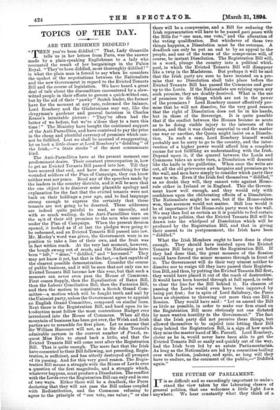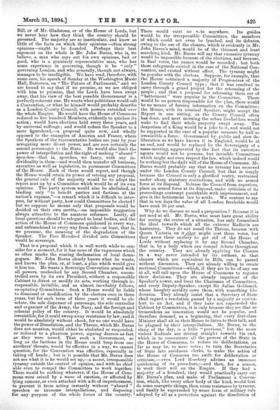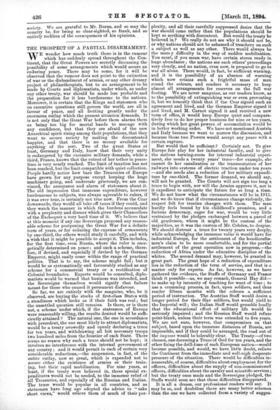THE FUTURE OF PARLIAMENT.
IT is so difficult and so exceedingly important to node:- stand the view taken by the labouring classes of general politics, that one welcomes a little light fi o n anywhere. We hear constantly what they think of a Bill, or of Mr. Gladstone, or of the House of Lords, but we never hear how they think the country should be governed. The majority are so inarticulate, and know so little of the facts on which their opinions—often strong opinions—ought to be founded. Perhaps their best exponent on the whole is Mr. John Burns, who is, we believe, a man who says out his own opinions, bad or good, who is a genuinely representative man, who has some experience in governing, though it be " only " governing London, and who generally, though not always, manages to be intelligible. We have read, therefore, with some care, his speech of Sunday at the Washington Music Hall, Battersea, on " The Future of Parliament," and we are bound to say that if we premise, as we are obliged with him to premise, that the Lords have been swept away, that his view of the best possible Government is a perfectly coherent one. He wants what politicians would call a Convention, or what he himself would probably describe as a London County Council, with powers extended over the whole Empire. He would have the House of Commons reduced to five hundred Members, evidently to quicken its action ; would have elections held every three years, and by universal suffrage ; and would reduce the Speaker to a mere figurehead,—a proposal quite new, and wholly opposed to the examples of America and France, where the Speakers of the representative bodies are year by year arrogating more direct power, and are now certainly the second personages in the State. He would also limit the power of interpellation and the right of making " absurd " speeches—that is, speeches, we fancy, with any in- dividuality in them—and would then transfer all business, executive as well as legislative, to permanent Committees of the House. Each of these would report, and though the House would retain its power of vetoing any proposal, the general rule of the majority would be to adopt the report sent up by a Committee which would be of its own opinions. The party 'system would also be abolished, as tending only "to benefit parties and factions at the nation's expense,"—a remark which it is difficult to inter- pret, for without party, how could Committees be elected ? but we suppose he means only that proposals would be decided on their own merits,—an impossible suggestion always attractive to the amateur reformer. Lastly, all local questions should be relegated to local bodies, and the action of the House of Commons quickened in every way, and enfranchised in every way from rule—at least, that is, we presume, the meaning of the degradation of the Speaker. The Five Hundred divided into Committees would be sovereign.
That is a proposal which it is well worth while to con- sider for a moment, for it has none of the vagueness which so often marks the roaring declamation of local dema- gogues. Mr. John Burns clearly knows what he wants, and knows the plan, or, at least, a plan which would give it him too. He wants a Sovereign Convention armed with all powers, unchecked by any Second Chamber, uncon- trolled even by its own President, without a responsible Cabinet to direct or modify its acts, working through ir- responsible, invisible, and as almost inevitably follows, co-optating Committees. Such a. House would be liable to dismissal or modification by the electors once in three years, but for each term of three years it would be ab- solute, the sole dispenser of patronage, the sole controller and organiser of the Army, the Navy, and the foreign and colonial policy of the country. It would be absolutely irresistible, for it could sweep away resistance by law; and it would be absolutely without check, for no one would have the power of Dissolution, and the Throne, which Mr. Burns does not mention, would either be abolished or suspended, or reduced to a phantom power, signing decrees as fast as they were issued. That such a Government, so long as the factions in the House could keep from one anothers' throats, would be effective in a way, we cannot question, for the Convention was effective, especially in taking off heads ; but is it possible that Mr. Burns does not see what it is he would set up,—a secret, irresponsible tyranny outside the control of opinion, and with no chief able even to compel the Committees to work together. There would be nothing whatever, if the House of Com- mons were seized by a wave of emotion, or affected by lying rumour, or even attacked with a fit of imperiousness, to prevent it from acting instantly without "absurd " speeches or tiresome interpellations, and disposing for any purpose of the whole forces of the country. There would exist no veto anywhere. Its guides would be the irresponsible Committees, the members of which could not even be lynched, and its debates, owing to the use of the closure, which is evidently in Mr. John Burns's mind, would be of the thinnest and least searching kind. Mr. Burns will say that excessive tyranny would be impossible because of the elections, and because, in final votes, the names would be recorded ; but both these safeguards existed in the case of the National Con- vention, and existed without effect. The tyranny might be popular with the electors. Suppose, for example, that the House contained a majority of Progressives of the London County Council type ; that it was resolved to carry through a grand project for the rehousing of the people ; and that a proposal for rehousing them out of " betterment " were popular in the Committee. There would be no person responsible for the plan, there would be no means of forcing information on the Committee ; the House, with its nominal Speaker, might accept the Report in one sitting, as the County Council often has done, and next morning the urban freeholders would wake to find their whole property swept away. The despotism of a King would be a joke to it, and would not be supported in the case of a popular measure by half so irresistible a force. Government by public and slow de- liberation as we have known it in England, would be at an end, and would be replaced by the Sovereignty of a mass-meeting, aggravated by the fact that its executive agents would not be persons, but invisible Committees which might not even respect the law, which indeed would be nothing but the daily will of the House of Commons. Mr. Burns would probably say that no tyranny has occurred under the London County Council, but that is simply because the Council is only a glorified vestry, restrained under sharp statutory restrictions, and with no armed force at its disposal. Release the Council from superiors, place an armed force at its disposal, make criticism of its proceedings contempt punishable with imprisonment, and give it the betterment law to settle. We venture to say that in ten days the value of all London freeholds would have sunk 30 per cent.
Why do we discuss so mad a proposition ? Because it is not mad at all. Mr. Burns, who must have great ability for seeing the centre of a situation, has only formulised the ideal towards which all the extreme Radicals are hastening, They do not assail the Throne, because with Queen Victoria on might cost them votes, but they avow their anxiety to get rid of the House of Lords without replacing it by any Second Chamber, that is, by a body which can compel debate throughout the country. They are already applying the Closure in a way never intended by its authors, so that clauses which are equivalent to Bills, can be passed without discussion. They are already willing to create sectional Committees—which, if they are to be of any use at all, will call upon the House of Commons to register their decisions. They are already impatient of the Speaker's power, and treat the Chairman of Committees, and every Deputy-Speaker, except Sir Julian Goldsmid, whose haughty acridity cows them, with something like derision. They already insist that a Secretary of State shall regard a resolution passed by a majority as equiva- lent to an Act, and if they have not superseded the Cabinet by Committees, it is only because they see that so tremendous an innovation would not be popular, and therefore demand, as a beginning, that every first-class Minister shall sit in their House to listen to their talk, and be plagued by their interpellations. Mr. Burns, in the slang of the day, is a little "previous," but the more violent Radicals are driving straight towards his end, which is to concentrate all the powers of State tate in the House of Commons, to reduce its deliberations, as far as may be, to mere votes ; to turn the Secretaries of State into assiduous clerks, to make the action of the House of Commons too swift for deliberation or criticism,— even Lord Rosebery advises an immense quickening of its procedure,—and then, for a season, to work their will on the Empire. If they had a majority of a hundred, they would practically carry out Mr. Burns's plan, and make of Parliament a Conven- tion, which, like every other body of the kind, would first do some energetic things, then rouse resistance by tyranny, and finally be superseded by some form of military rule adopted by all as a protection against the dissolution of society. We are grateful to Mr. Burns, and so may the country be. for being so clear-sighted, so frank, and so entirely reckless of the consequences of his opinions.




































 Previous page
Previous page